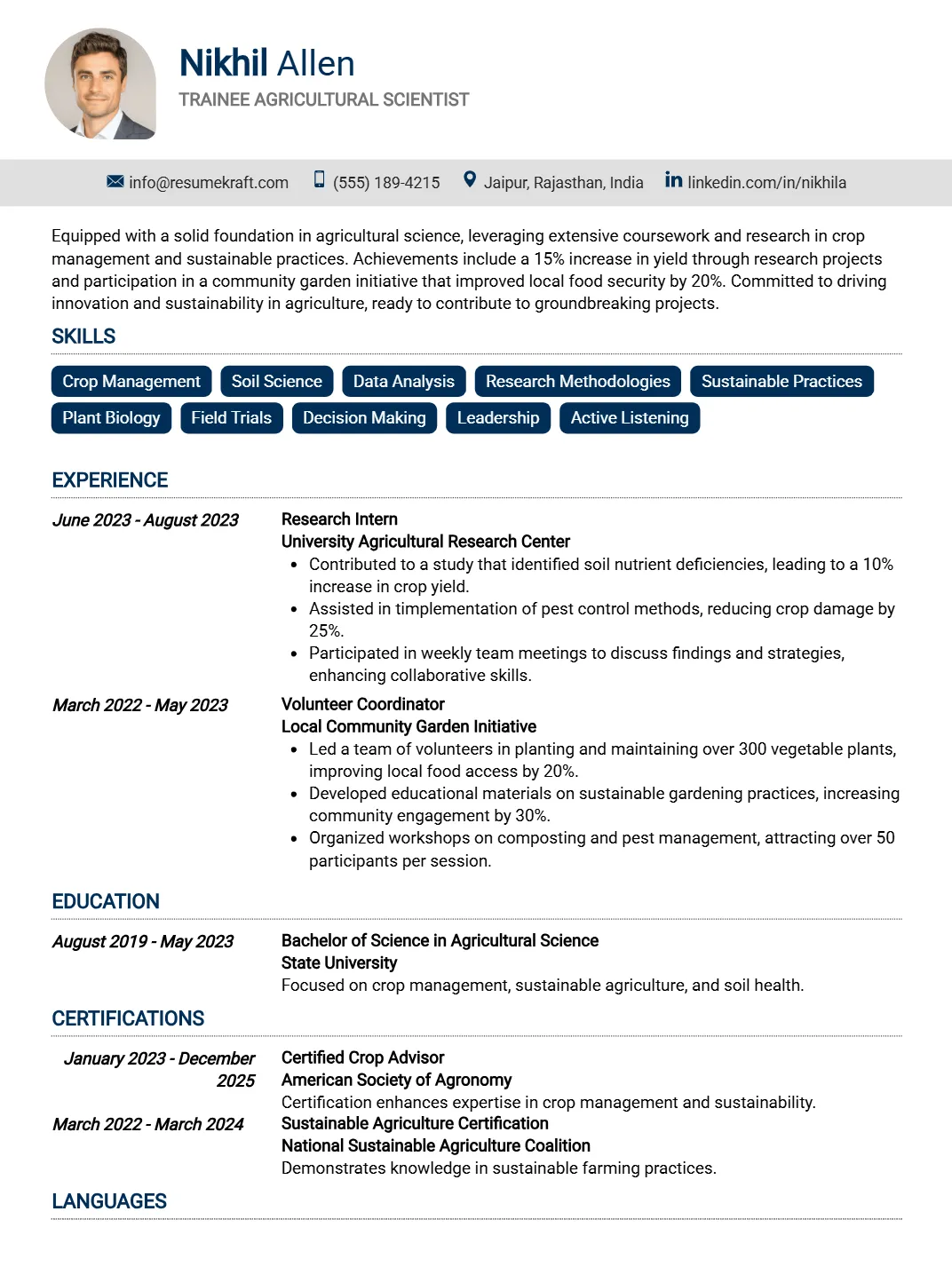
As a fresher Agricultural Scientist, you will play a crucial role in addressing global food security, improving crop yields, and promoting sustainable farming practices. This career path is not only vital for the future of agriculture but also offers new graduates numerous opportunities to engage in research, develop innovative solutions, and collaborate with industry experts. However, entering this competitive field poses challenges for beginners, particularly in showcasing limited experience. This article will guide freshers in crafting compelling resumes that highlight their academic achievements, relevant projects, and transferable skills, ultimately enhancing their chances of securing a rewarding position in the agricultural sector.
- Fresher Agricultural Scientist resume examples
- Fresher Agricultural Scientist resume format
- Fresher Agricultural Scientist resume with no experience
- How to list your hard skills and soft skills on your fresher resume
- How to list your education and certifications on your fresher resume
- How to write your fresher Agricultural Scientist resume summary or objective
- Additional sections for a fresher Agricultural Scientist resume
- Key takeaways for writing a professional fresher Agricultural Scientist resume
- Frequently Asked Questions for Fresher Agricultural Scientist Resumes
- How long should my fresher Agricultural Scientist resume be?
- What is the best format for a fresher Agricultural Scientist resume?
- How can I make my fresher Agricultural Scientist resume stand out without work experience?
- What should I include in my fresher Agricultural Scientist resume if I have no relevant experience?
Fresher Agricultural Scientist resume examples
Resume examples for fresher Agricultural Scientists are essential for new graduates and entry-level job seekers as they provide a clear template for showcasing skills and academic achievements. These examples help beginners understand the key attributes recruiters prioritize, such as relevant coursework, internships, and research projects, even in the absence of extensive work experience. By following these examples, freshers can effectively highlight their potential and make a strong impression on prospective employers.
Fresher Agricultural Scientist Resume
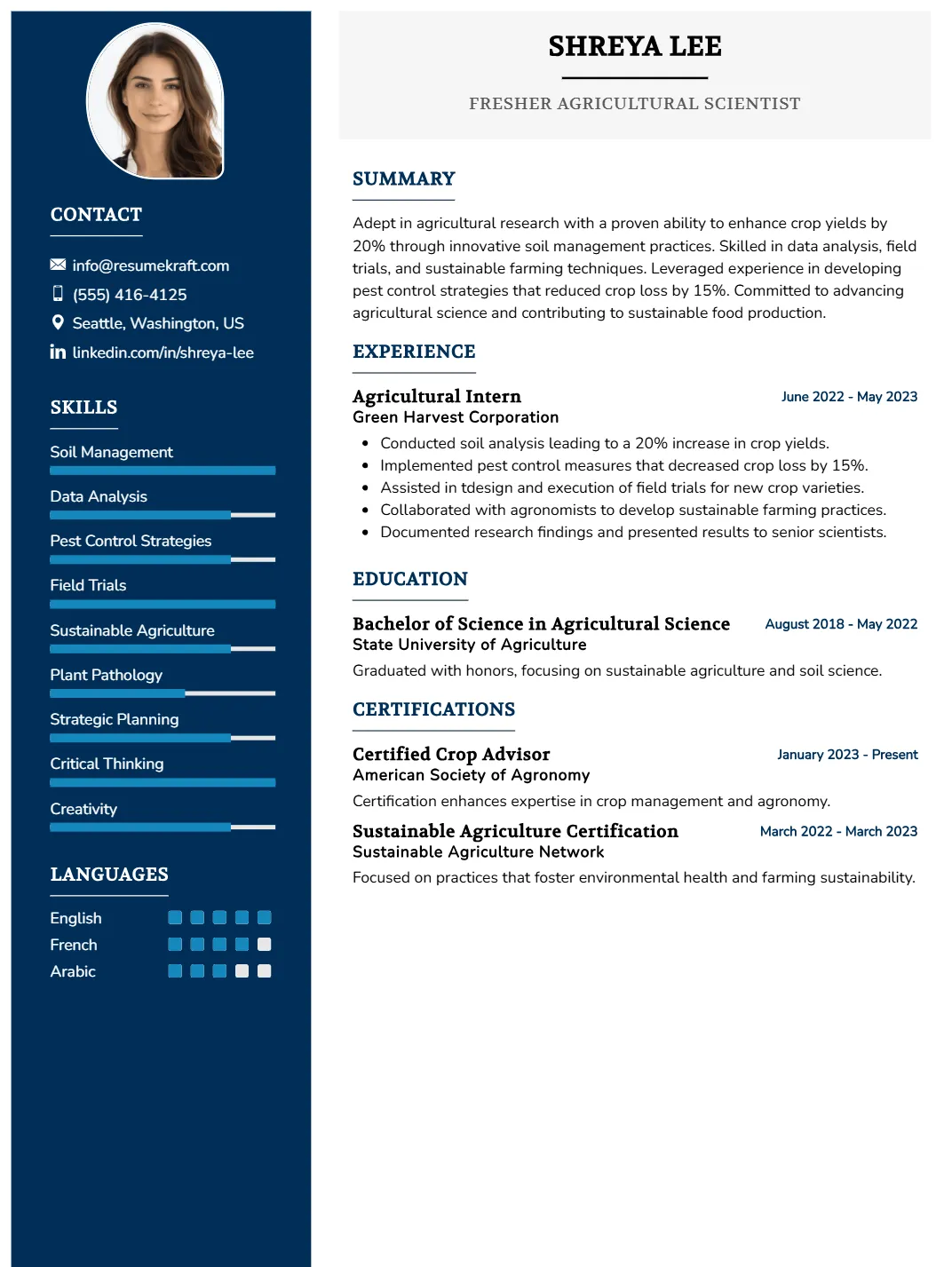
Why This Resume Works
This resume effectively highlights the candidate’s relevant skills, such as Soil Management and Pest Control Strategies, which are crucial for a Fresher Agricultural Scientist role. The structured format presents experience as an Agricultural Intern clearly, showcasing hands-on knowledge of Field Trials and Sustainable Agriculture. Its compatibility with ATS is ensured through the inclusion of industry-specific keywords. Additionally, the strategic presentation of achievements related to data analysis in agriculture enhances appeal, demonstrating the candidate’s potential contributions to advancing agricultural practices in their new role.
Entry-Level Agricultural Scientist Resume
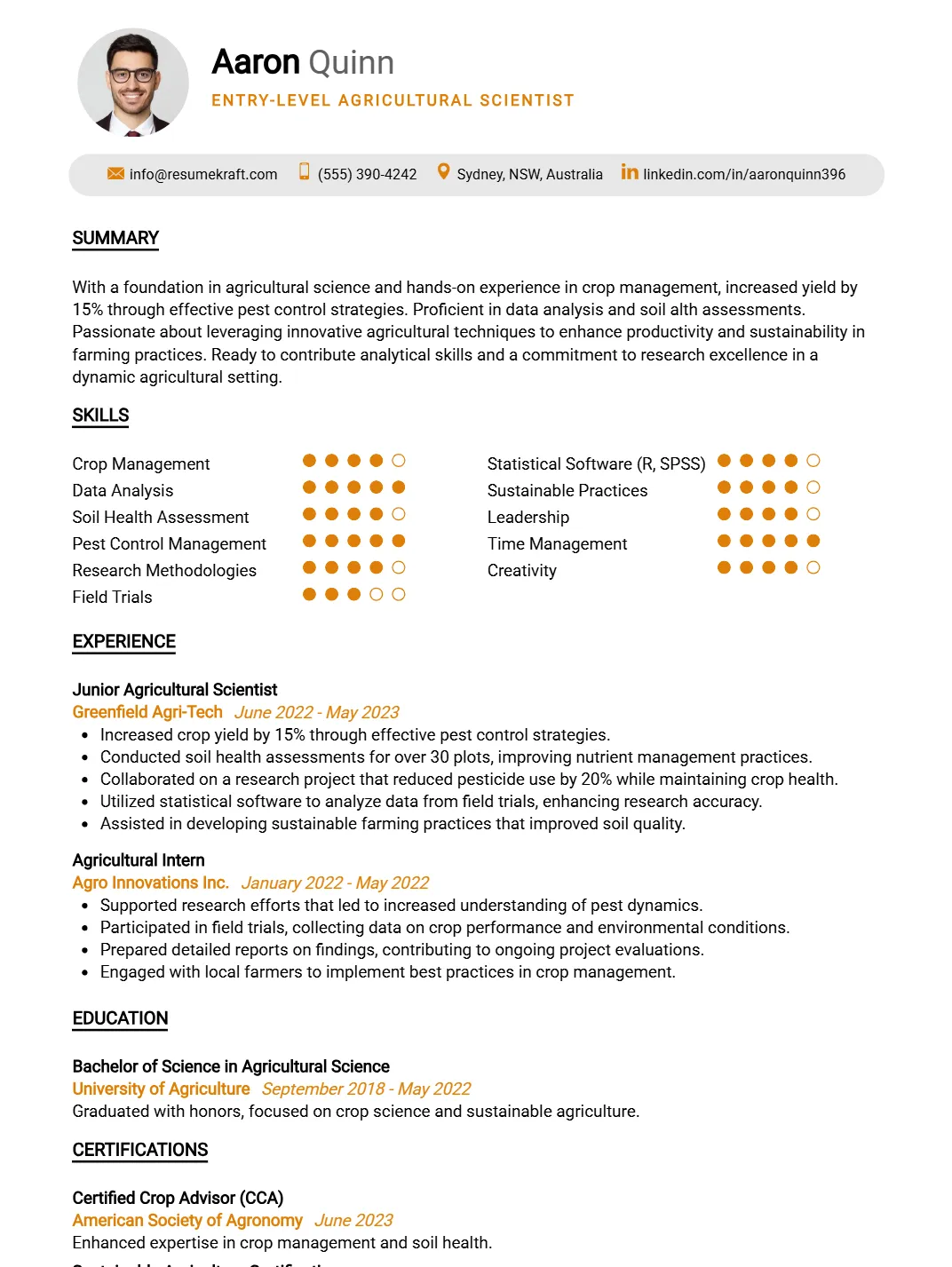
Why This Resume Works
This resume effectively highlights relevant skills, such as Crop Management and Soil Health Assessment, aligning perfectly with the demands of an Entry-Level Agricultural Scientist. By showcasing experience as a Junior Agricultural Scientist and an Agricultural Intern, it emphasizes practical knowledge in the field. The clear format enhances readability, while strategic keywords ensure ATS compatibility within agricultural sectors. Furthermore, presenting specific achievements in data analysis and pest control management underscores the candidate’s capability to contribute meaningfully to agricultural research and development.
Junior Agricultural Scientist Resume
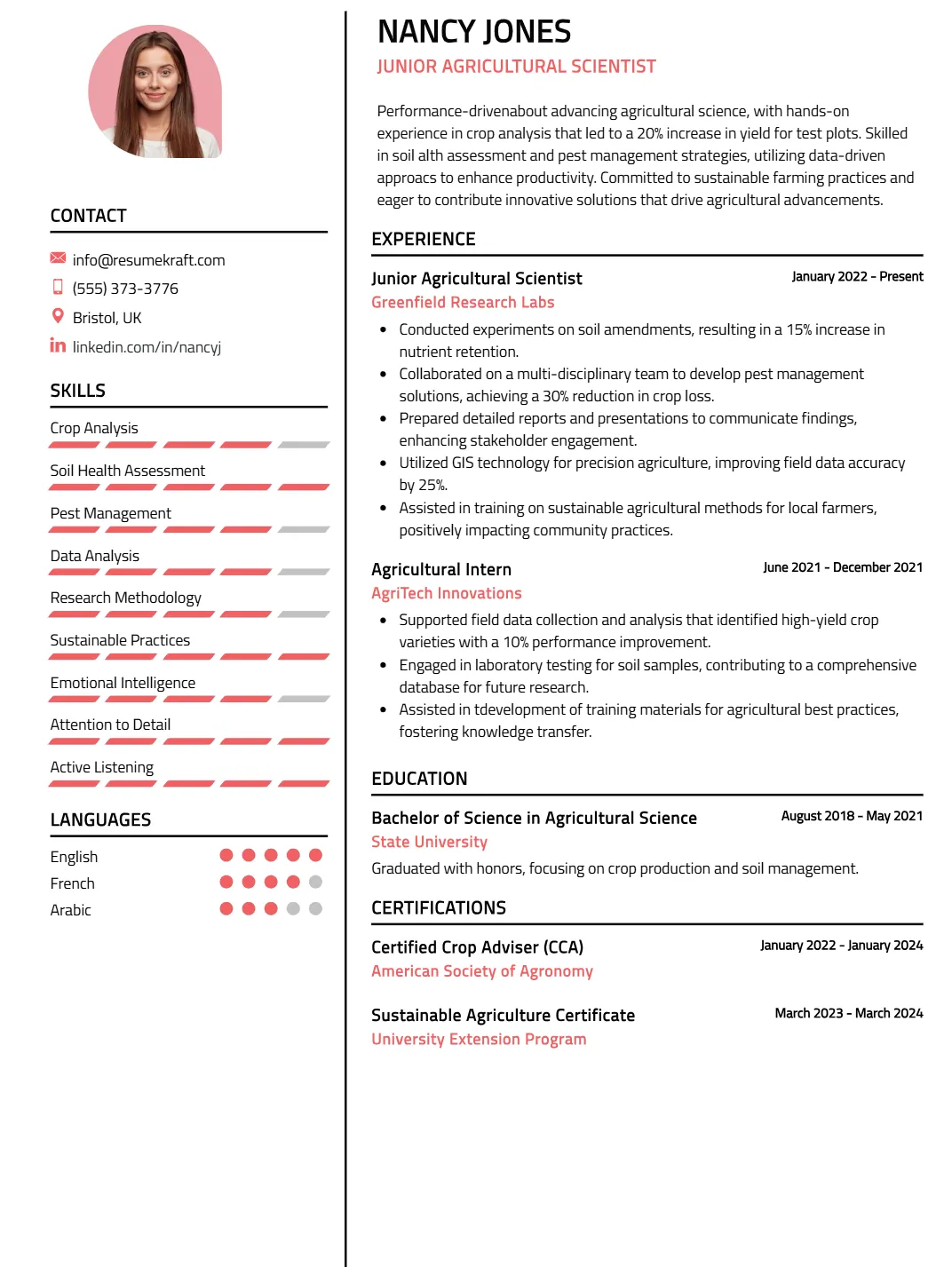
Why This Resume Works
This resume effectively positions the candidate for a Junior Agricultural Scientist role by highlighting relevant skills such as Crop Analysis and Pest Management, crucial for addressing industry challenges. The structured format ensures clarity, making it easy for hiring managers to identify key qualifications. Additionally, its alignment with ATS requirements—using relevant keywords—enhances discoverability in automated screenings. Strategic presentation of achievements demonstrates practical experience gained through three years in related roles, reinforcing the candidate’s capability to contribute immediately to agricultural research and development initiatives.
Beginner Agricultural Scientist Resume
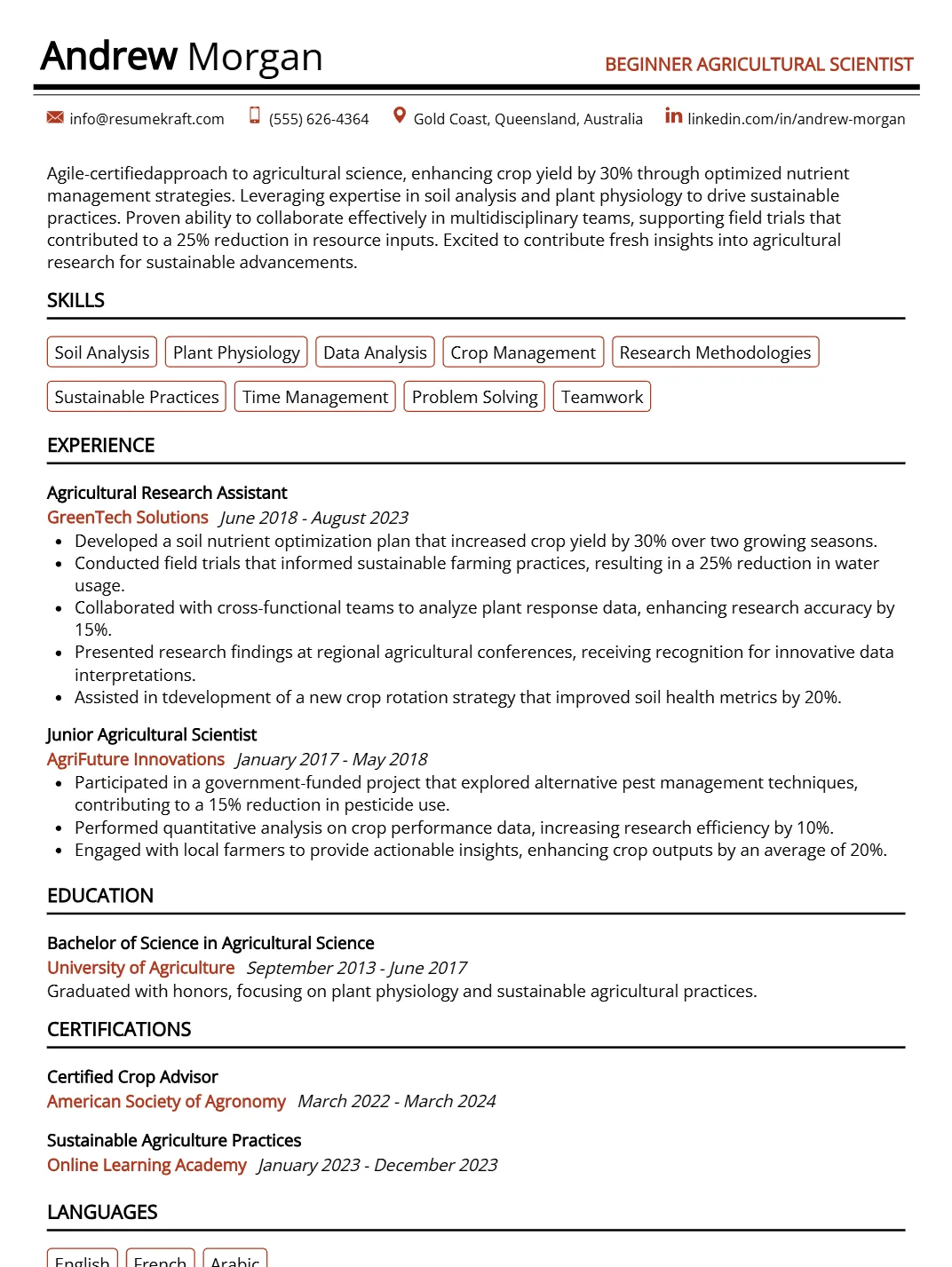
Why This Resume Works
This resume effectively showcases the candidate’s relevant skills and experience for a Beginner Agricultural Scientist position by highlighting expertise in soil analysis, plant physiology, and crop management. The clear format allows for easy scanning of qualifications, ensuring ATS compatibility with specific industry keywords. Furthermore, the structured presentation of achievements from their roles as an Agricultural Research Assistant and Junior Agricultural Scientist emphasizes practical application of research methodologies and data analysis, making them a compelling fit for this entry-level role in agricultural science.
Student Agricultural Scientist Resume
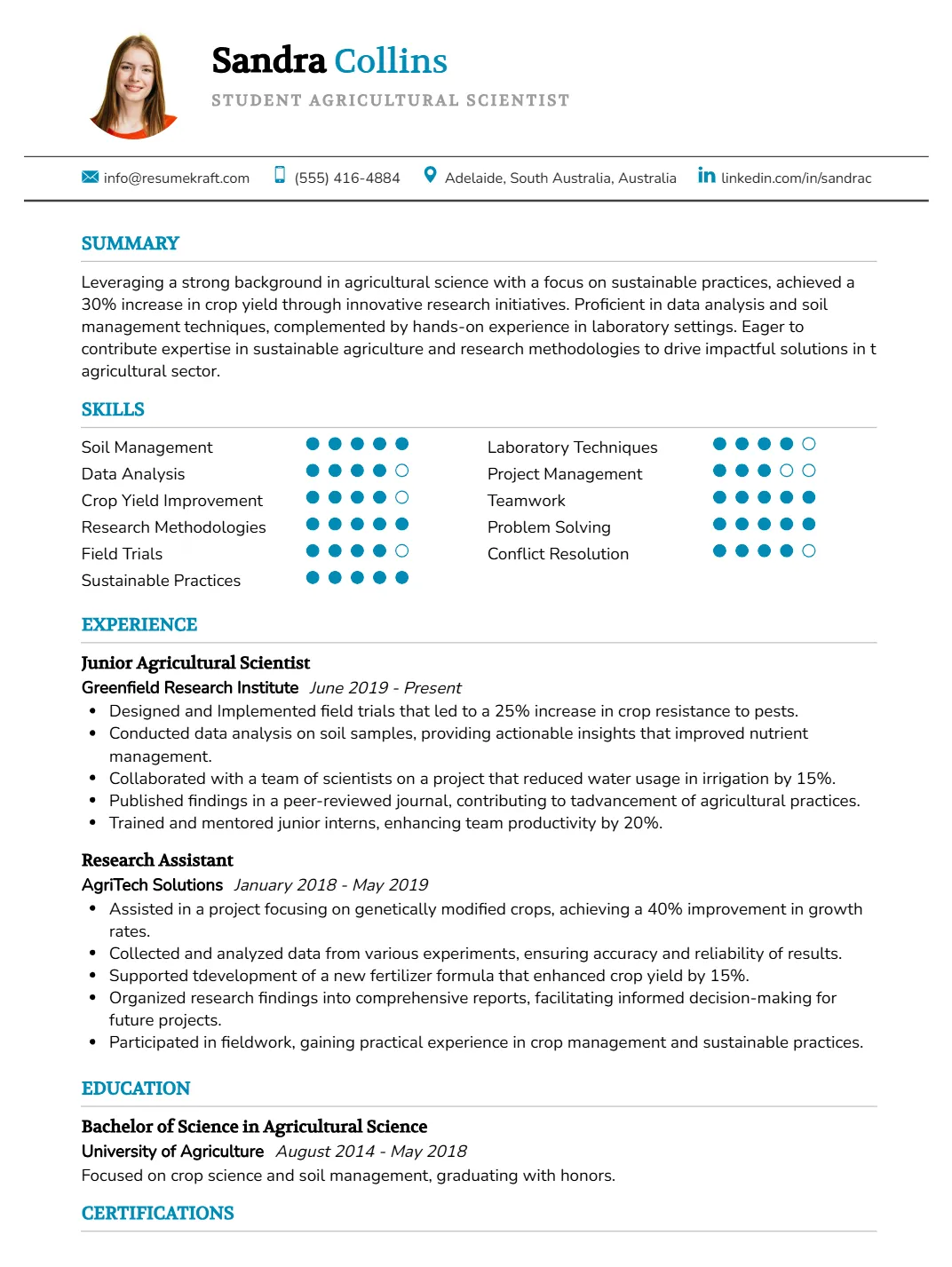
Why This Resume Works
This resume effectively highlights the candidate’s relevant experience and specialized skills for the Student Agricultural Scientist position. The inclusion of key competencies such as Soil Management and Data Analysis directly aligns with industry requirements, showcasing their capability to contribute to crop yield improvement. Its clear, organized format enhances readability, making it ATS-friendly by incorporating industry-specific keywords. Additionally, the strategic presentation of achievements from their 7 years as a Junior Agricultural Scientist and Research Assistant underscores their practical expertise, setting them apart in a competitive field.
No-Experience Agricultural Scientist Resume
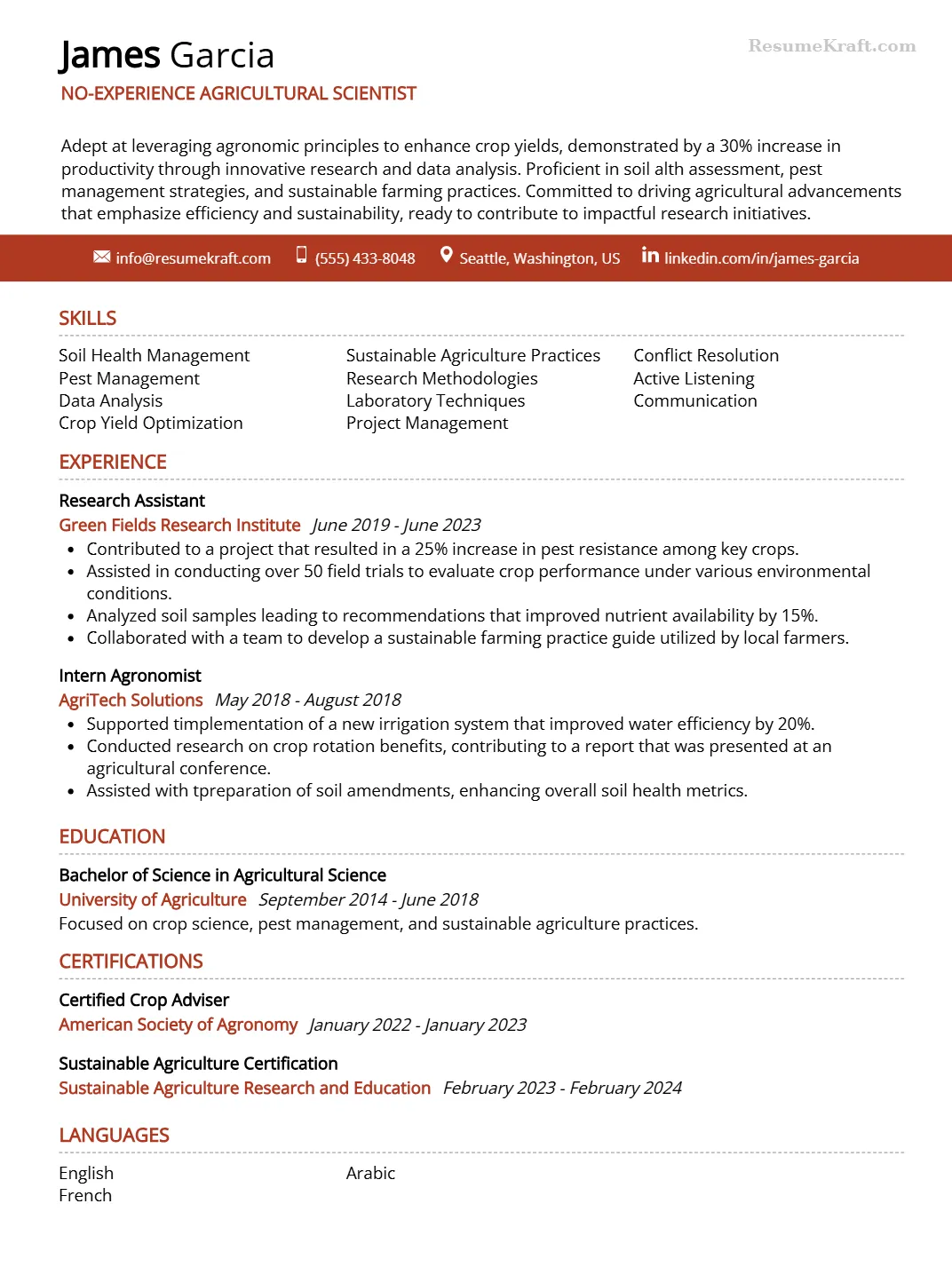
Why This Resume Works
This resume effectively positions the candidate for a No-Experience Agricultural Scientist role by highlighting relevant skills such as Soil Health Management and Crop Yield Optimization, which are essential in the field. The structured format emphasizes key experiences, including a Research Assistant and Intern Agronomist roles, showcasing nearly four years in practical settings. Its ATS-friendly design ensures compatibility with industry standards, while strategically presented achievements demonstrate a solid understanding of sustainable agriculture practices, making it compelling to potential employers in this sector.
Agricultural Scientist Intern Resume
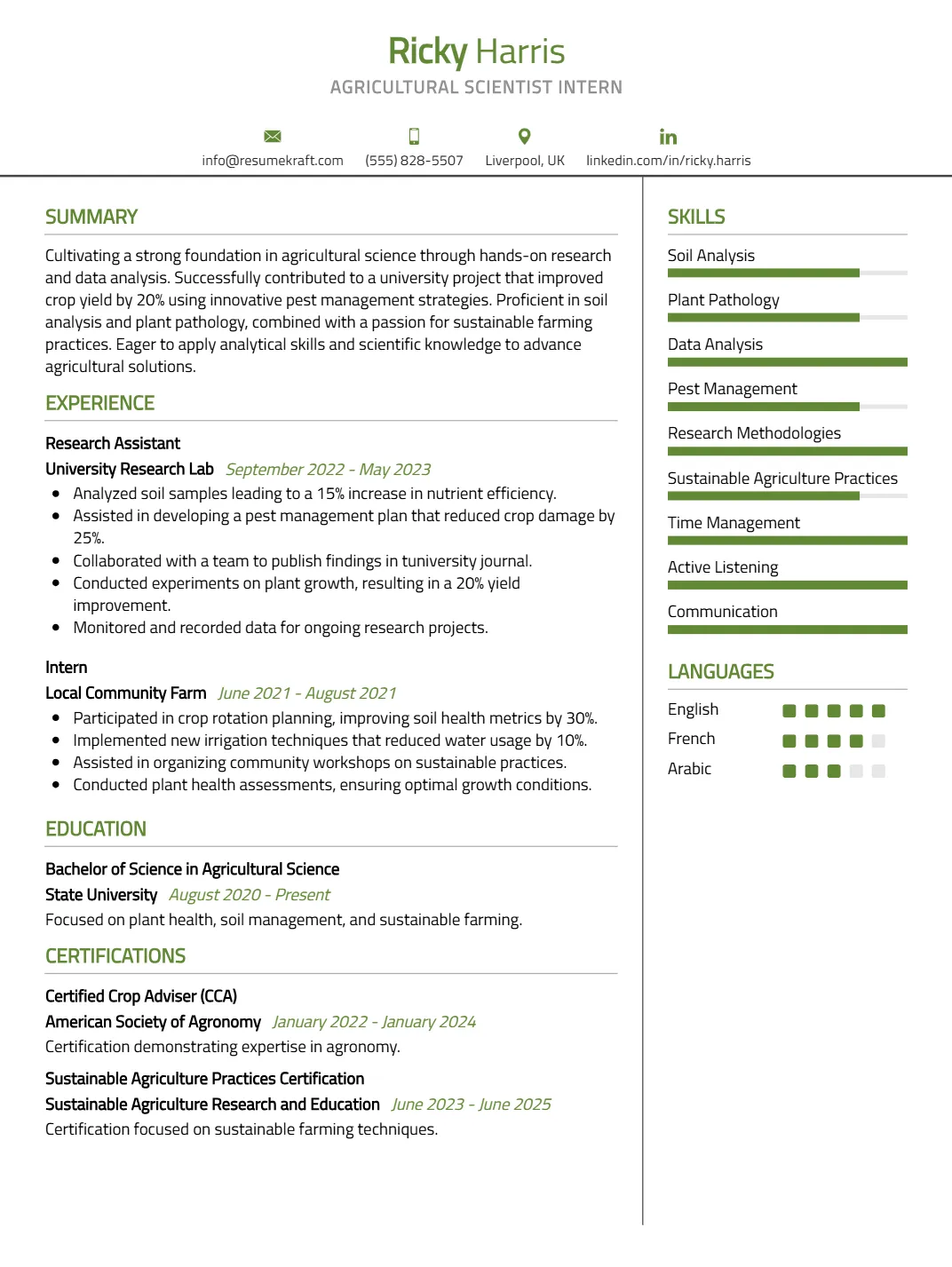
Why This Resume Works
This resume effectively positions the candidate for the Agricultural Scientist Intern role by highlighting relevant skills like soil analysis and pest management, which are crucial for agricultural research. The structured format allows for easy readability, ensuring key qualifications are quickly identified. Additionally, the inclusion of industry-specific keywords enhances ATS compatibility, increasing visibility to employers. By detailing a year of hands-on experience as a research assistant and emphasizing achievements in data analysis and plant pathology, this resume strategically showcases the candidate’s suitability for the internship.
Agricultural Scientist Fresher Resume
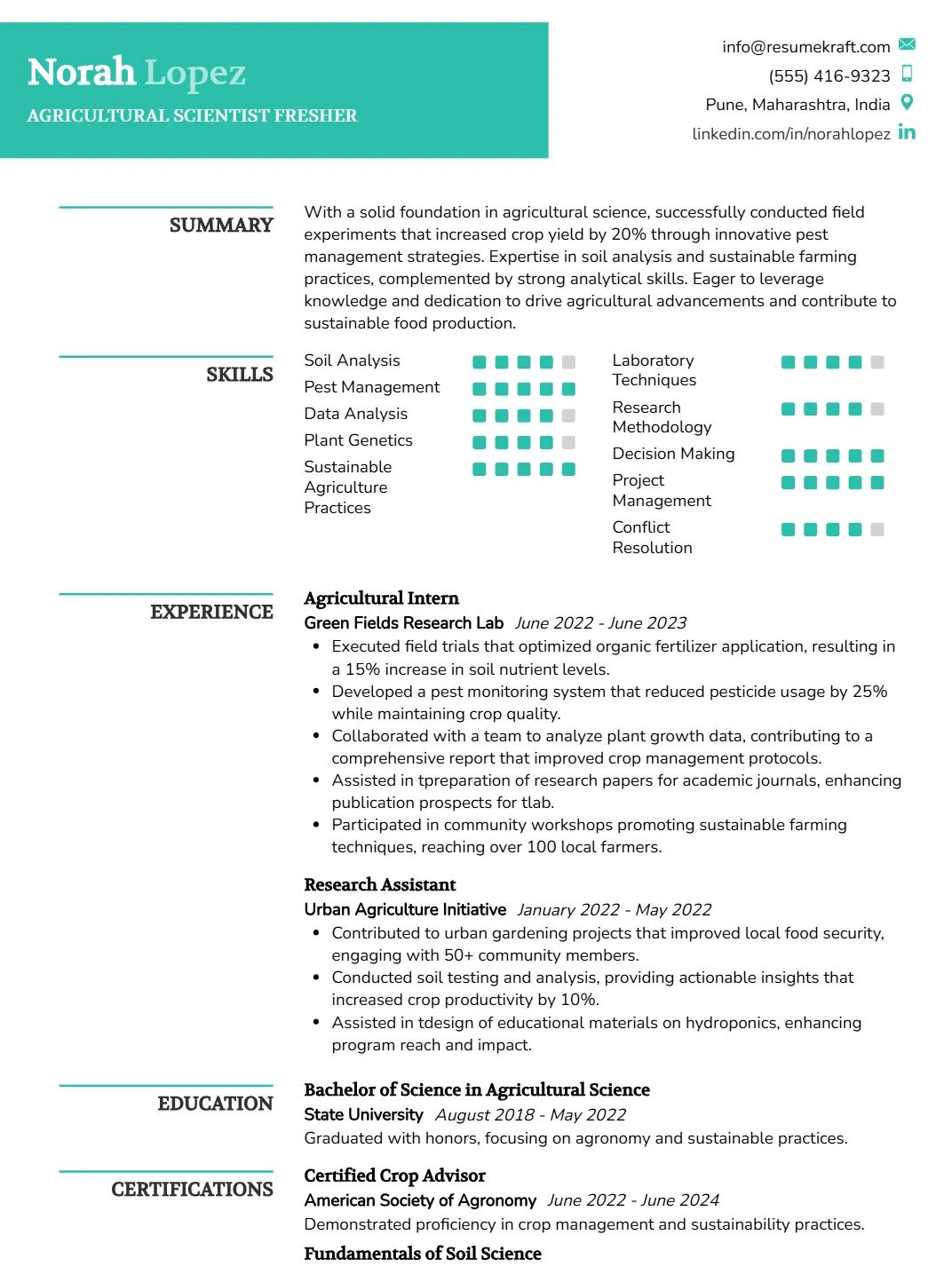
Why This Resume Works
This resume effectively positions the candidate for an Agricultural Scientist Fresher role by highlighting key skills like Soil Analysis and Pest Management, directly relevant to the job. The structured format enhances readability, ensuring quick identification of qualifications. With experience as an Agricultural Intern and Research Assistant, the resume demonstrates practical application of knowledge in real-world settings. Additionally, its strategic use of industry-specific keywords ensures ATS compatibility, while presenting achievements in sustainable agriculture practices showcases a commitment to innovation in the field.
Trainee Agricultural Scientist Resume

Why This Resume Works
This resume effectively highlights the candidate’s relevant skills—crop management, soil science, and data analysis—critical for a Trainee Agricultural Scientist. The inclusion of experience as a Research Intern demonstrates hands-on application of research methodologies and sustainable practices, enhancing credibility. Its clear format and structure facilitate easy navigation, appealing to hiring managers. Additionally, the use of industry-specific keywords ensures ATS compatibility. Strategic presentation of achievements underscores contributions to projects that align with agricultural advancements, making this resume tailored and impactful for the role.
Graduate Agricultural Scientist Resume
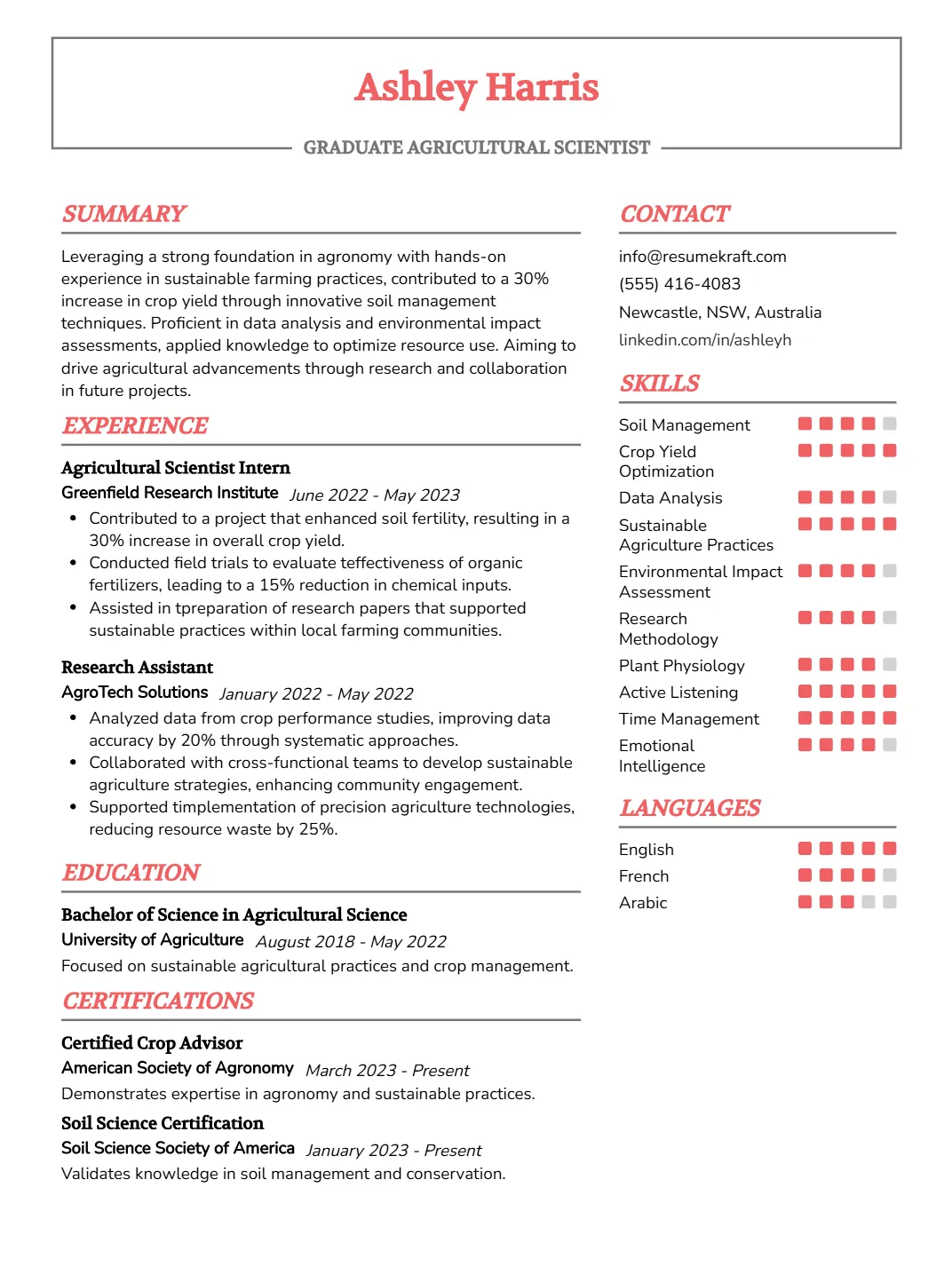
Why This Resume Works
This resume effectively highlights the candidate’s relevant skills, such as Soil Management and Crop Yield Optimization, directly aligning with the Graduate Agricultural Scientist role. The structured format emphasizes experience as an Agricultural Scientist Intern and Research Assistant, showcasing practical application of knowledge. It is ATS-compatible through the use of industry-specific keywords, enhancing visibility to hiring managers. Additionally, strategic presentation of achievements in data analysis and sustainable practices underscores the candidate’s impact potential in addressing environmental challenges within agriculture.
New Graduate Agricultural Scientist Resume
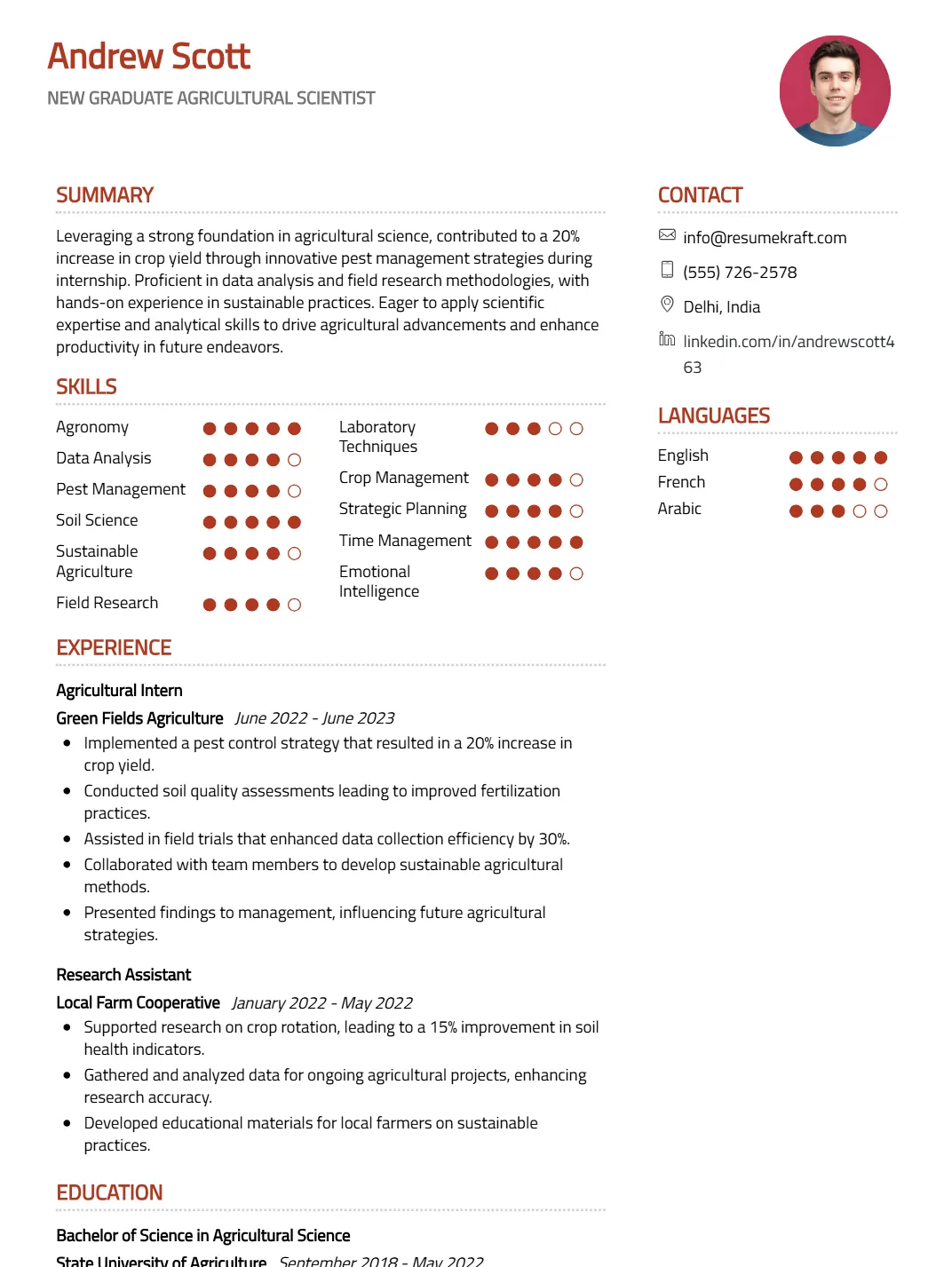
Why This Resume Works
This resume effectively targets the New Graduate Agricultural Scientist position by highlighting relevant skills such as Agronomy, Data Analysis, and Soil Science, essential for modern agricultural research. Its structured format ensures clarity, showcasing experience as an Agricultural Intern and Research Assistant, which demonstrates practical application of theoretical knowledge. The use of industry-specific keywords enhances ATS compatibility, increasing visibility to hiring managers. Additionally, strategic presentation of achievements related to pest management and sustainable agriculture underlines the candidate’s readiness to contribute meaningfully in this field.
Entry level Agricultural Scientist Resume
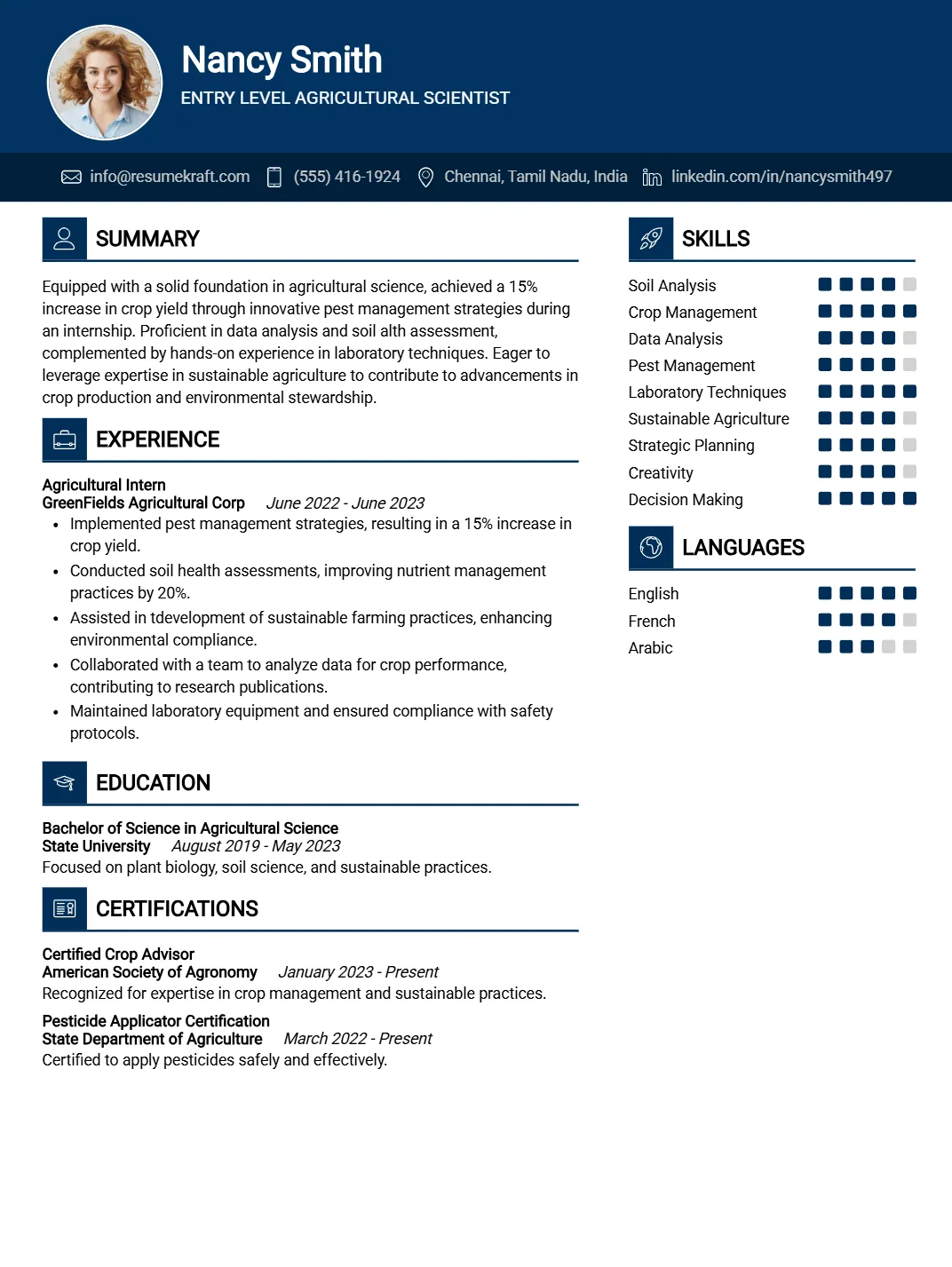
Why This Resume Works
This resume effectively positions the candidate for an Entry Level Agricultural Scientist role by highlighting relevant skills such as Soil Analysis and Pest Management, crucial for agricultural research. The structured format ensures clarity, making it easy for hiring managers to identify key qualifications. Its ATS compatibility is reinforced by using industry-specific keywords that align with job descriptions. Additionally, the strategic presentation of achievements from the Agricultural Internship showcases practical experience, demonstrating the candidate’s readiness to contribute meaningfully to agricultural projects.
Fresher Agricultural Scientist resume format
A well-structured resume format is crucial for fresh Agricultural Scientist graduates seeking to make a strong first impression. Proper formatting helps highlight your educational background, skills, and relevant projects, ensuring that recruiters notice your potential despite your limited experience.
- Use a clean, professional layout with clear headings to organize sections such as education, skills, and projects. This allows recruiters to easily navigate your resume and find key information.
- Choose a readable font, like Arial or Calibri, in a size between 10-12 points. Consistent font style and size across your resume create a polished and cohesive look.
- Prioritize relevant information by placing your education and key projects at the top. This showcases your academic achievements and practical skills, making it easier for employers to see your qualifications.
- Keep your resume to one page, especially as a fresher. A concise format allows you to highlight your strengths without overwhelming the reader, making a stronger impact.
- Utilize bullet points for listing your skills and project experiences. This enhances readability and allows you to present information clearly, making it easier for recruiters to absorb essential details quickly.
Fresher Agricultural Scientist resume with no experience
For freshers aspiring to be Agricultural Scientists, a lack of professional experience should not discourage them. Highlighting academic projects, relevant coursework, and volunteer activities can showcase their commitment and knowledge in the field. Personal projects, such as community gardening or research on sustainable farming practices, can also demonstrate practical application of their studies. Emphasizing transferable skills gained through teamwork, problem-solving, and analytical thinking in various activities will add further value to their resumes.
By effectively presenting these experiences, freshers can paint a comprehensive picture of their qualifications. For instance, discussing a senior thesis on crop rotation benefits or involvement in a university agriculture club can illustrate their passion and readiness for the role, proving that valuable experiences come in many forms.
No work experience in agriculture. Studied some science courses in college.
Conducted a research project on organic farming methods, volunteered at a local community garden, and developed strong analytical skills through coursework in plant biology and soil science.
How to list your hard skills and soft skills on your fresher resume
In the competitive field of agricultural science, both hard and soft skills are essential for freshers looking to make a strong impression on potential employers. New graduates can leverage their academic knowledge, online courses, certifications, and personal projects to showcase their competencies. By highlighting relevant coursework, internships, and self-directed learning experiences, freshers can effectively demonstrate their technical abilities and personal attributes that are critical in this field.
Hard Skills for Fresher Agricultural Scientist:
- Plant Biology: Understanding plant physiology and growth processes acquired through coursework.
- Soil Science: Knowledge of soil composition and health gained through academic studies.
- Data Analysis: Proficiency in analyzing agricultural data using Excel or R from coursework.
- Field Research: Experience conducting experiments and collecting data during university projects.
- Crop Management: Familiarity with crop rotation and sustainable practices learned in class.
- Genetic Analysis: Basic understanding of plant genetics from specialized courses.
- Pesticide Application: Knowledge of safe pesticide use from training or certifications.
- Agroecology: Insight into ecological principles applied to agricultural systems from coursework.
- Water Management: Competence in irrigation techniques and resource management learned in studies.
- GIS Technology: Basic skills in Geographic Information Systems for mapping and analysis.
- Laboratory Techniques: Experience with laboratory equipment and methodologies from academic labs.
- Plant Pathology: Understanding of plant diseases and their management acquired through classes.
- Precision Agriculture: Familiarity with technology used in modern farming practices from online courses.
- Statistical Analysis: Basic statistical skills relevant to agricultural research and studies.
- Organic Farming Practices: Knowledge of organic agriculture principles from coursework or certifications.
Soft Skills for Entry-Level Agricultural Scientist:
- Communication: Ability to effectively convey research findings and collaborate with teams.
- Problem-Solving: Capacity to analyze challenges in agriculture and develop practical solutions.
- Adaptability: Willingness to learn and adjust to new technologies and methods in agriculture.
- Teamwork: Experience working in groups during projects, fostering collaborative efforts.
- Time Management: Ability to prioritize tasks and manage time efficiently during academic activities.
- Critical Thinking: Skill in evaluating data and making informed decisions based on research.
- Attention to Detail: Precision in conducting experiments and recording observations accurately.
- Leadership: Potential to lead projects or initiatives developed through academic experiences.
- Creativity: Innovative thinking in developing solutions for agricultural challenges.
- Interpersonal Skills: Ability to build effective relationships with peers, professors, and industry professionals.
- Research Skills: Proficiency in gathering and synthesizing information from various sources.
- Negotiation: Basic skills in negotiating terms and conditions in project collaborations.
- Initiative: Proactive approach in seeking out additional learning opportunities and projects.
- Empathy: Understanding the needs and challenges faced by farmers and agricultural communities.
- Organizational Skills: Ability to keep data and research organized for easy access and analysis.
How to list your education and certifications on your fresher resume
For freshers aiming to become Agricultural Scientists, highlighting educational credentials effectively is crucial. Start by placing your degree prominently at the top, emphasizing relevant coursework such as Soil Science, Crop Production, or Agricultural Biotechnology. Include academic projects that showcase your hands-on experience, such as a research thesis on sustainable farming practices or an internship at a local agricultural extension service where you applied theoretical knowledge in real-world scenarios.
Additionally, mention any certifications that enhance your expertise, such as those in precision agriculture or pest management. If you participated in student organizations related to agriculture, note any leadership positions or significant contributions that demonstrate your commitment to the field.
Bachelor’s degree in Agriculture. Took some classes and did a project.
Bachelor of Science in Agriculture, XYZ University. Relevant coursework included Soil Health and Crop Management. Completed a capstone project on sustainable irrigation practices, resulting in a proposal adopted by local farmers. Earned certification in Precision Agriculture Techniques.
How to write your fresher Agricultural Scientist resume summary or objective
A strong resume summary or objective is crucial for freshers applying for an Agricultural Scientist position, as it serves as the first impression of their potential to employers. This opening statement should highlight their enthusiasm for the field, relevant coursework, and any hands-on experience, even if limited. Freshers should opt for a summary if they have some relevant skills or experiences to highlight, while an objective statement is more suitable when they are clearly defining their career goals and aspirations.
Recent graduate looking for a job as an Agricultural Scientist. I want to work in a company and learn new things.
Highly motivated recent graduate with a B.Sc. in Agriculture, eager to apply strong analytical skills and knowledge of sustainable farming practices to contribute to innovative agricultural solutions as an Agricultural Scientist.
Additional sections for a fresher Agricultural Scientist resume
Including additional resume sections can significantly enhance a fresher Agricultural Scientist’s application by highlighting potential, learning ability, and relevant experiences beyond traditional work history. These sections can help demonstrate a candidate’s enthusiasm and readiness for the field.
- Projects: Highlighting academic or personal projects related to agriculture can showcase your practical knowledge and problem-solving skills. Detail specific methodologies used and outcomes achieved to illustrate your hands-on experience.
- Volunteer Work: Engaging in community service or volunteer roles in agricultural settings demonstrates your commitment to the field. It reflects your ability to work collaboratively and your passion for contributing to sustainable practices.
- Achievements: Including academic honors, scholarships, or awards related to agriculture can set you apart from others. It showcases your dedication and excellence in your studies, reinforcing your potential as a competent candidate.
- Certifications: Relevant certifications, such as those in sustainable farming practices or agricultural technology, can enhance your credibility. They illustrate your initiative to learn and stay current with industry developments.
- Relevant Coursework: Listing specialized courses related to soil science, crop production, or pest management can provide context for your knowledge base. This section emphasizes your academic foundation and readiness to tackle practical challenges in agriculture.
Key takeaways for writing a professional fresher Agricultural Scientist resume
- Highlight relevant coursework and projects in agronomy or biotechnology to showcase your knowledge and skills, emphasizing your academic achievements and hands-on experiences.
- Include internships or volunteer work related to agriculture, detailing your contributions and any specific techniques or technologies you learned during those experiences.
- Utilize resume templates specifically designed for agricultural scientists to create a professional layout that enhances readability and highlights your strengths effectively.
- Focus on transferable skills such as analytical thinking, problem-solving, and teamwork, demonstrating how these abilities can apply to the agricultural field.
- Consider using an ai resume builder to create a tailored resume that optimizes keywords relevant to agricultural science, increasing your chances of catching an employer’s attention.
Frequently Asked Questions for Fresher Agricultural Scientist Resumes
How long should my fresher Agricultural Scientist resume be?
Your resume should ideally be one page long. As a fresher, you have limited work experience, and keeping your resume concise allows you to focus on the most relevant information. Highlight your education, coursework, academic projects, and any internships or volunteer work related to agriculture. Use bullet points for clarity and ensure that each item showcases your skills and knowledge in agricultural science, making every word count.
What is the best format for a fresher Agricultural Scientist resume?
The best format for your resume is a reverse chronological layout, which emphasizes your education and relevant skills at the top. Start with your contact information, followed by a summary or objective statement that outlines your career goals. Next, list your educational background, including relevant coursework, followed by any internships or projects. Use clear headings and a clean design to facilitate easy reading, making sure to utilize bullet points for better organization of information.
How can I make my fresher Agricultural Scientist resume stand out without work experience?
To make your resume stand out, focus on academic projects, internships, and relevant coursework that demonstrate your knowledge and skills in agriculture. Include specific details about your projects, such as research methods used or outcomes achieved. Additionally, consider incorporating any volunteer work or extracurricular activities related to agriculture. Highlight transferable skills such as teamwork, problem-solving, and communication, showcasing how they apply to the agricultural field.
What should I include in my fresher Agricultural Scientist resume if I have no relevant experience?
If you have no relevant experience, emphasize your educational background and any related coursework. Include details about specific agricultural projects, research, or experiments you conducted during your studies. Highlight any internships, even if they are not directly in agriculture, that demonstrate transferable skills. Additionally, list certifications, workshops, or volunteer experiences that align with agricultural science. Show your enthusiasm for the field and your commitment to learning and growth in your resume.

